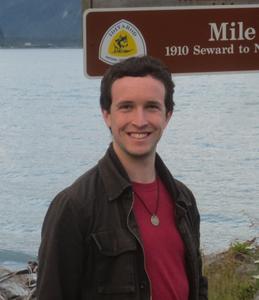ESP Biography
MICHAEL DUBREUIL, Biology Graduate Student & Evolution Enthusiast
|
Major: Cancer Biology College/Employer: Stanford Year of Graduation: 2019 |

|
Brief Biographical Sketch:
I am a 5th year graduate student (aka 21st grade) in the Cancer Biology Program here at Stanford. I study oxidative stress in human cells, but I love learning about all aspects of the world around us through science. Past Classes(Clicking a class title will bring you to the course's section of the corresponding course catalog)R7561: The Search for Life in the Universe in Splash Fall 2019 (Nov. 16 - 17, 2019)
Are we alone in the universe? How can we know? If we do find life, where can we find it and what will it look like? Will it be microbial or multi-cellular? Will life on other planets even have cells?
In this class we'll discuss these questions and the modern attempts to answer them in a brief overview of the Search for Life in the Universe!
R6955: The Search for Life in the Universe in Splash Spring 2019 (May. 04 - 05, 2019)
Are we alone in the universe? How can we know? If we do find life, where can we find it and what will it look like? Will it be microbial or multi-cellular? Will life on other planets even have cells?
In this class we'll discuss these questions and the modern attempts to answer them in a brief overview of the Search for Life in the Universe!
R6727: The Search for Life in the Universe in Splash Fall 2018 (Dec. 01 - 02, 2018)
Are we alone in the universe? How can we know? If we do find life, where can we find it and what will it look like? Will it be microbial or multi-cellular? Will life on other planets even have cells?
In this class we'll discuss these questions and the modern attempts to answer them in a brief overview of the Search for Life in the Universe!
R6251: The Search for Life in the Universe in Splash Spring 2018 (May. 05 - 06, 2018)
Are we alone in the universe? How can we know? If we do find life, where can we find it and what will it look like? Will it be microbial or multi-cellular? Will life on other planets even have cells?
In this class we'll discuss these questions and the modern attempts to answer them in a brief overview of the Search for Life in the Universe!
R5932: The Search for Life in the Universe in Splash Fall 2017 (Nov. 11 - 12, 2017)
Are we alone in the universe? How can we know? If we do find life, where can we find it and what will it look like? Will it be microbial or multi-cellular? Will life on other planets even have cells?
In this class we'll discuss these questions and the modern attempts to answer them in a brief overview of the Search for Life in the Universe!
R5464: The Search for Life in the Universe in Splash Spring 2017 (Apr. 22 - 23, 2017)
Are we alone in the universe? How can we know? If we do find life, where can we find it and what will it look like? Will it be microbial or multi-cellular? Will life on other planets even have cells?
In this class we'll discuss these questions and the modern attempts to answer them in a brief overview of the Search for Life in the Universe!
R5365: The Search for Life in the Unierse in Splash Fall 2016 (Dec. 03 - 04, 2016)
Are we alone in the universe? How can we know? If we do find life, where can we find it and what will it look like? Will it be microbial or multi-cellular? Will life on other planets even have cells?
In this class we'll discuss these questions and the modern attempts to answer them in a brief overview of the Search for Life in the Universe!
B4976: Speciation: Classifying the Biological World in Splash Spring 2016 (Apr. 09 - 10, 2016)
The concept of species has been used since the early days of biology to classify the natural world around us. However, we are ever coming to realize designating one species from another is not as easy as it first appears.
We will be talking about what makes a species, where our classifications break down, hybrid species, and the human species
B4171: Modern Techniques in Biology in Splash Spring 2015 (Apr. 11 - 12, 2015)
This is an informal class that will go over a few techniques that are used in biology laboratories from Stanford to Beijing, from small academic labs to biotechnology giants like Genentech. Examples include PCR, sequencing, and antibody-based procedures
B3874: Evolution: the Saga of Life in Splash Fall 2014 (Nov. 08 - 09, 2014)
Evolution: the process that's responsible for all life you see around you. In this class, you'll get a brief introduction to the process of evolution and hear a collection interesting evolutionary stories from eye evolution to how humans are still evolving today.
B3974: DNA and You: a Tale of Compaction in Splash Fall 2014 (Nov. 08 - 09, 2014)
DNA has existed for billions of years, but does it do? In this class, we'll explore the role of DNA and how cells can pack so much of it into one tiny space (Strawberry's have 9 feet of DNA in each cell!). This will also include a short lab where we will extract DNA from strawberries.
B3275: When life gives you lemons, eat a miracle berry... in Splash! Fall 2013 (Nov. 02 - 03, 2013)
Learn about the science behind taste! How do we sense and distinguish different tastes? How do taste buds work? Find out all this and more!
At the end of the class you will be able to try a "Miracle Berry Tablet" which will make sour foods taste sweet.
|
|
